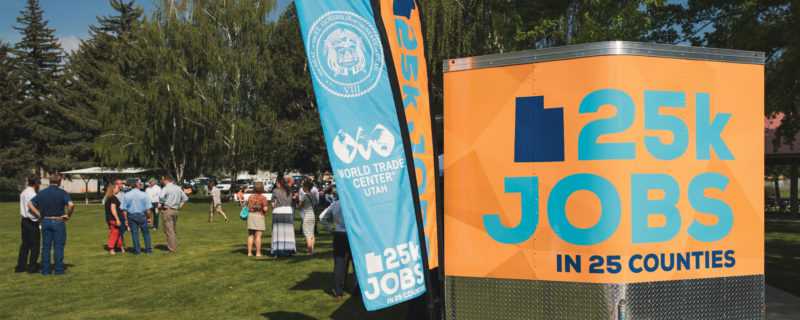In 2017, Gov. Gary Herbert issued a challenge to small businesses to create 25,000 jobs in Utah’s 25 rural counties over the next four years. In typical Utah fashion, residents answered the challenge with an overwhelming response. This ambitious undertaking is known as the 25k Jobs initiative.
Many Utahns may ask, “How has the state performed on this ambitious initiative?” Utah gained 29,156 new jobs, or approximately 117% of the goal, from the start of the initiative through the end of 2019.
The 25K Jobs initiative brought partners from all corners of the state to engage with rural communities and explore new economic development opportunities. Partners in the 25K Jobs initiative included GOED, World Trade Center Utah, EDCUtah and the state Department of Workforce Services. Each organization brought representation to a series of outdoor listening sessions to share their input with businesses and local government agencies.
“Leading out on the 25k Jobs tour with GOED was an invaluable opportunity to see firsthand how we could better support rural growth,” said Jim Porter, director of business development at World Trade Center Utah. “Working with government and business leaders in every county showed us the unique obstacles to prosperity and the real reasons for hope in each region. As a result, WTC Utah enhanced our rural programs, generating new global growth for Utah’s rural businesses.”
The primary goal of the listening tour was to help communities clear roadblocks that impede economic progress. GOED and its partners traveled the state to meet with rural community residents and business leaders. There were often presentations by Lt. Gov. Spencer Cox, Val Hale, executive director at the Governor’s Office of Economic Development, and Derek Miller, formerly with World Trade Center Utah.
“Each visit to a rural county revealed its unique business challenges and led to productive dialog about how job numbers could be improved in each county,” said Val Hale, GOED’s executive director. “The result was a tailored approach to how each county planned to achieve economic prosperity.”
As part of the initiative, each rural county was asked to produce an economic development strategic plan and present it to Gov. Gary Herbert. The governor spent several months meeting rural county representatives to discuss incentives, grants and funding opportunities.
Knowing local leadership is most aware of its needs, the governor asked them to bring locally-driven solutions to the table for creating new jobs. Most rural counties responded and presented their strategic plans directly to the governor.



